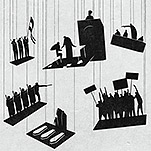OVER the past 20 years, to loud laments from media veterans, American news organizations have retreated from the costly business of foreign coverage — closing bureaus, slashing space and airtime. Yet for the curious reader with a sense of direction, this is a time of unprecedented bounty.
Op-Ed Columnist
It’s the Golden Age of News

By BILL KELLER
Published: November 3, 2013
Connect With Us on Twitter
For Op-Ed, follow @nytopinion and to hear from the editorial page editor, Andrew Rosenthal, follow @andyrNYT.
I begin my day with this paper’s foreign staff — 75 reporters in 31 bureaus. I’ll listen to NPR at the gym, then look at The Wall Street Journal and The Financial Times, peruse the websites of The Guardian and the BBC, check my AP mobile app. Later I’ll visit Al Jazeera English for its “Syria’s War” blog, followed by the “Global” section of The Atlantic, the “Regions” tab at Foreign Affairs and some of the bloggers at Foreign Policy. If my Russian feels up to it, I’ll listen to a feed of the independent Moscow radio station Ekho Moskvy, and I’ll probably drop by a feisty news website called The Daily Maverick in another country I follow, South Africa. The #Turkey Twitter stream I set up for a reporting trip last summer has gone a little quiet lately, but YouTube has lots of indignant European officials fulminating about American eavesdropping. After all that, if I’m not sated, well, I’ve bookmarked onlinenewspapers.com, which links to thousands of papers and magazines.
Yes, there are fewer and fewer experienced correspondents out there, but I can now access all of them without leaving my desk, and most of this feast will be free. When auto-translate software gets better, I’ll even have access to news sources in Persian and Mandarin.
Not only that, but since the world got connected it’s become much harder for authoritarian regimes to hide news. In 1982, when President Hafez al-Assad of Syria crushed a rebel uprising by literally flattening the city of Hama, the story was little more than a rumor for months; and according to Thomas Friedman, who covered it for The Times, the only reason Assad eventually let journalists in to see the carnage was to give his subjects an object lesson in how troublemakers would be treated. Nowadays we can watch the atrocities perpetrated by Assad’s son Bashar on YouTube in real time.
When practitioners of global reporting get together — as some of us did last week for a stimulating conference on the future of foreign news at Boston College — one question on the table is whether, for all the moaning, we are now enjoying a golden age of global news. My own view is: “yes, but.” I’ve already explained the “yes.” Now the “but.”
The problem with the cutbacks in professional foreign coverage is not just the loss of experience and wisdom. It’s the rise of — and exploitation of — the Replacements, a legion of freelancers, often untrained and too often unsupported. They gravitate to the bang-bang, because that’s what editors and broadcast producers will pay for. And chances are that nobody has their backs.
Some of them, of course, are tremendously talented, and many prefer freelance work over staff jobs for the freedom to cover what interests them. But for most of them, I suspect, it’s not a choice. Freelance work has long been a way to break into the business of international reporting; nowadays, increasingly, it is the business.
A foreign assignment at a major news organization has traditionally come with traveling expenses, medical coverage, security and first-aid training if you are covering conflict, fixers and translators and, in a few instances, paid leave for language training. It comes with technicians who make sure your computer and satellite phone work. It comes with lawyers in case you get sued or arrested. It comes with editors who will tell you not to take foolish chances, and notify your family if something bad happens.
These days the disturbing trend is to pay freelancers on spec. Without even offering a contract or a formal assignment, which at least implies some responsibility, news organizations ask independent reporters to pitch completed stories or photos after the rental cars have been paid for, after the work has been done — after the risks have been taken. (And even then, it can be an ordeal to get paid. A freelancer in Yemen recently started a campaign to “name and shame” news organizations that stiff journalists.) When a freelancer gets into trouble in a conflict zone, “You just fall into a black hole,” said Emma Beals, a British journalist who has worked in Syria and has become an advocate for freelancers there and in other treacherous places. She estimates that there are currently 17 kidnapped foreign journalists being held by various factions in Syria’s civil war. The majority of them are freelancers.
Frustration and danger have inspired some efforts to organize. Beals is part of a group of volunteers that aims to provide training, insurance, assignments and other services for independent journalists. (For Internet billionaires seeking a good cause, it’s called the Frontline Freelance Register.) The journalist Sebastian Junger has started a program that trains freelance combat journalists in emergency medical procedures. (Internet billionaires: it’s called RISC, for Reporters Instructed in Saving Colleagues.) Lily Hindy, deputy director of RISC, says that many freelancers turn to self-support networks because they are reluctant to antagonize potential employers. “The only thing worse than being exploited,” she said, “is not being exploited at all.”
My other caveat about this time of abundance is that while it’s great for a foreign-news junkie, I’m not sure how well it serves the passive reader. The profusion of unfiltered information can overwhelm without informing. So while it is true that the outside world learned almost instantaneously of the horrific August chemical attack in Syria, the flood of social media was contaminated by misinformation (some of it deliberate) and filled with contradictions — enough to let the regime and its supporters blame the massacre on the rebels with an almost straight face. Even after United Nations inspectors had visited the site and filed a report, they did not resolve the question of culpability. It took an experienced reporter familiar with Syria’s civil war, my colleague C. J. Chivers, to dig into the technical information in the U.N. report and spot the evidence — compass bearings for two chemical rockets — that established the attack was launched from a Damascus redoubt of Assad’s military.
“Social media isn’t journalism,” Chivers told the Boston conference. “It’s information. Journalism is what you do with it.”
PETER GOODMAN, an editor at The Huffington Post — where you might expect to find scant sympathy for the decline of Old Media — cautions against proclaiming a golden age. In a post a few weeks ago, he wrote: “Those of us who make our living producing web-based journalism need to acknowledge this basic truth: Despite the obvious and abundant promises of the web, and despite the inarguable fact that the digital future is now irretrievably the present, foreign news is at a crisis point.”
He went on to point out that there is no substitute for professional foreign correspondents who go back again and again, “having conversations that go on longer than needed merely to grab a handy quote to jam in a story.” HuffPo, to its credit, is beginning to build a small foreign staff that Goodman, a former China correspondent, will oversee.
Joe Kahn, the international editor of The Times, is a little more sanguine. “It doesn’t quite feel like a golden age at the moment (does any age feel golden if you’re living in it?),” he conceded in an email, “ but if you had to construct one you’d probably want some combination of the traditional, professional journalism of the postwar era with the digital free-for-all of the last few years, and with luck that’s what we have.”
Yes. But.
















